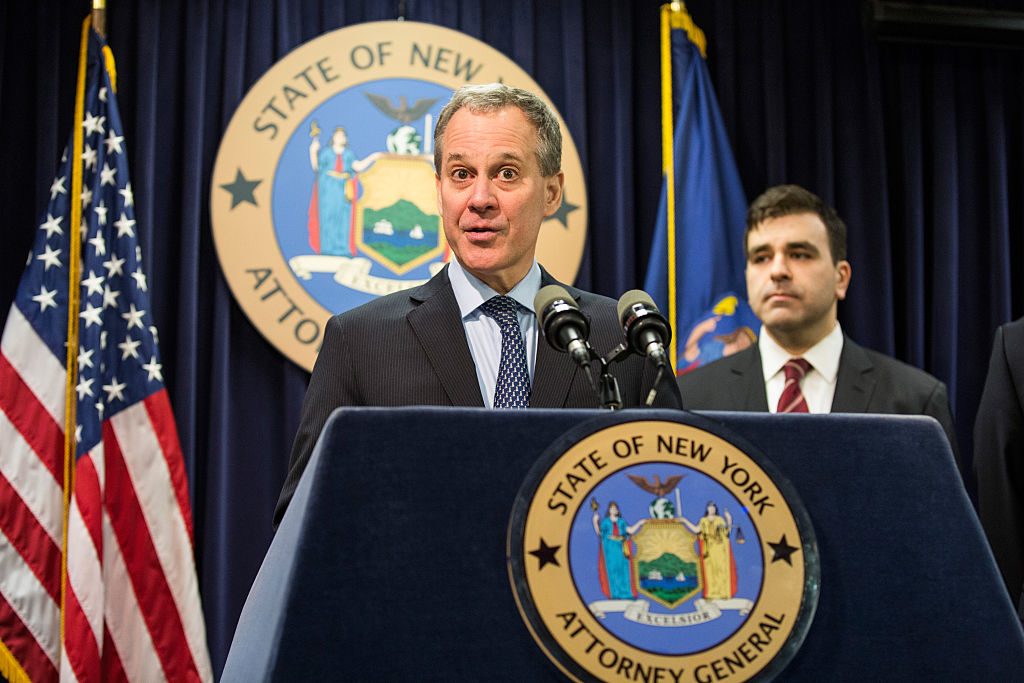The state's Martin Act creates a risky climate for companies by putting too much power in the hands of a single politician
Last month, New York Attorney General Eric Schneiderman issued a subpoena to Exxon Mobil demanding documents, emails and financial records relating to the oil giant’s statements about risks to the company from climate change. The attorney general also revealed a similar ongoing investigation against Peabody Energy, the nation’s largest coal producer. These actions not only highlight an increasingly worrisome tendency among leaders on the left to squelch dissenting viewpoints but also the dangerous reach of the New York securities law Schneiderman invoked: the Martin Act.
“The Martin Act is a powerful weapon... it combines broad civil investigative powers, criminal prosecution authority, and a sweeping definition of “fraud” that requires no showing of ill intent, public reliance or injury.”
The law, named for legislative sponsor Louis Martin, was enacted in 1921—years before the great stock market crash of 1929 and more than a decade before Congress enacted the federal securities laws in its wake. The act was one of many state “blue sky” laws enacted in this period, when securities regulation was nonexistent, in response to concerns that fraudulent stockbrokers were selling shares in fictitious companies that had no genuine operating business and consisted of little more than “the blue sky above.”
Initially only geared toward civil enforcement, the Martin Act was expanded to give criminal-enforcement powers in 1955, under Attorney General Jacob Javits. He soon headed to the U.S. Senate, and his successors resisted the temptation to use the broad new powers until the next century, when Eliot Spitzer dusted it off and fashioned it as his weapon of choice in his self-appointed role as Sheriff of Wall Street.
The Martin Act is a powerful weapon indeed, as it combines broad civil investigative powers, criminal prosecution authority, and a sweeping definition of “fraud” that requires no showing of ill intent, public reliance or injury. As defined by the New York courts, the Martin Act reaches "all acts" that might "deceive or mislead the purchasing public," even if they do not originate "in any actual evil design or contrivance to perpetuate fraud or injury upon others."
As such, the Martin Act is perfectly suited as a vehicle for carrying out “truth inquisitions” against publicly traded companies that may present opinions contrary to those of elected officials. And that is a dangerous proposition when wielded by politicians aspiring to higher office, like Spitzer and his successors, Andrew Cuomo and Schneiderman. That’s all the more true because New York courts have decided that they have no authority to review the attorney general’s discretion under the act.
In targeting oil and coal companies over climate change, Schneiderman is to some degree following the trail laid by his attorney general forebears in the 1990s, who took on tobacco companies in part over executives’ statements about the health risks of smoking. In the state AGs’ tobacco litigation, internal documents from the tobacco companies that suggested their knowledge about smoking’s dangers were vital—notwithstanding that such dangers were broadly known long before the 1990s and featured prominently on cigarettes’ packaging in a warning from the U.S. surgeon general.
“However alarming one views the future threat posed by climate change, it is not best answered by untethered regulatory fiat from a single elected state official, under criminal threat, flowing from an outdated state securities law.”
There are many differences between smoking and climate change. Smoking imposes significant costs on states’ health-care spending for programs like Medicaid—ultimately, the basis for the damages recovered in the 1998 settlement between state attorneys general and tobacco companies. The costs of climate change, in contrast, are decades in the future. Thus, whatever Schneiderman may find, a tobacco-style settlement with energy companies is likely not in the cards. But the threat of criminal sanctions under the Martin Act, which can be the death knell for a publicly traded company, give the attorney general a powerful trump card.
However alarming one views the future threat posed by climate change, it is not best answered by untethered regulatory fiat from a single elected state official, under criminal threat, flowing from an outdated state securities law. From an investor’s perspective, there is a case to be made that climate-change disclosures are germane, if attenuated: Although the costs of far-in-the-future environmental impacts are essentially meaningless to pricing a company’s stocks today, the risks of government regulation—including whatever may come out of the recent Paris agreement—are very real to companies in the energy sector. For just that reason, the federal Securities and Exchange Commission in 2010 issued new guidance requiring publicly traded companies to make climate change-related disclosures.
The SEC’s decision was controversial—it passed the commission by a 3–2 vote—but at least the federal securities laws don’t permit what amounts to little more than a fishing expedition by politicians with an eye toward higher office. The Martin Act is an ill-structured law conceived at a time when our securities markets were wholly unregulated. Today, those same markets are so heavily regulated that companies are exiting them (the number of public companies today is roughly half what it was 15 years ago). The Martin Act has outlived its usefulness, and New York’s legislature would be well advised to sweep it into the dustbin of history.
This piece originally appeared in Crain's New York
This piece originally appeared in Crain's New York Business
